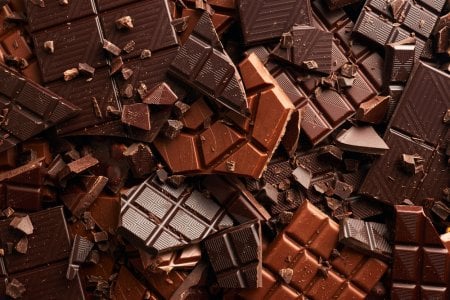Researchers find chocolate products can increase risk of cancer
By
Seia Ibanez
- Replies 40
For many of us, indulging in a piece of chocolate is one of life's simple pleasures.
But recent findings from researchers in Belgium have cast a shadow over this sweet treat, revealing that some chocolate products may harbour a dark secret: the presence of potentially cancer-causing chemicals.
Before you reach for that chocolate bar or slice of cake, let's delve into the unsettling discovery made by the Louvain Institute of Biomolecular Science and Technology (IBST) in Belgium.
Researchers have identified that certain store-bought chocolate desserts could contain dangerous compounds that damage DNA and increase the risk of cancer.
These harmful substances, known as α,β-unsaturated carbonyls, are not sinister additives but rather the byproduct of roasting cocoa beans—a process essential for developing chocolate's rich flavour.
The concern arises when these compounds interact with proteins and enzymes in our stomachs, potentially causing cells to divide at an abnormal rate and leading to the formation of cancerous cells.
The study, which scrutinised 22 different desserts, including crepes, waffles, cakes, and biscuits, found varying levels of genotoxic furan compounds, which contain carcinogens.
While the researchers did not disclose the specific brands they tested, they did note that the products were sourced from Belgian supermarkets and included both national and distributor brands.
The study revealed that desserts like crepes, waffles, and cakes had the highest concentration of these toxic substances, with levels reaching 4.3 milligrams per kilogram.
To put this into perspective, the recommended daily intake of these compounds is a mere 0.15 milligrams.
‘Though naturally found in many foods, these carbonyls are also used as flavouring additives, and some have been banned in the European Union,’ the press release said.
Dr Alexandre Dusart, the study's lead author, emphasised the need for ongoing research to understand the 'key parameters' that influence the formation of these compounds and to limit their presence in our food.
'The European Food Safety Authority (EFSA) should perform risk assessments on such matters,' Dusart said.
'Based on these, risk management authorities should take relevant actions to protect consumers.'
 Will this research influence your chocolate-buying habits? Share your thoughts with us in the comments below!
Will this research influence your chocolate-buying habits? Share your thoughts with us in the comments below!
But recent findings from researchers in Belgium have cast a shadow over this sweet treat, revealing that some chocolate products may harbour a dark secret: the presence of potentially cancer-causing chemicals.
Before you reach for that chocolate bar or slice of cake, let's delve into the unsettling discovery made by the Louvain Institute of Biomolecular Science and Technology (IBST) in Belgium.
Researchers have identified that certain store-bought chocolate desserts could contain dangerous compounds that damage DNA and increase the risk of cancer.
These harmful substances, known as α,β-unsaturated carbonyls, are not sinister additives but rather the byproduct of roasting cocoa beans—a process essential for developing chocolate's rich flavour.
The concern arises when these compounds interact with proteins and enzymes in our stomachs, potentially causing cells to divide at an abnormal rate and leading to the formation of cancerous cells.
The study, which scrutinised 22 different desserts, including crepes, waffles, cakes, and biscuits, found varying levels of genotoxic furan compounds, which contain carcinogens.
While the researchers did not disclose the specific brands they tested, they did note that the products were sourced from Belgian supermarkets and included both national and distributor brands.
The study revealed that desserts like crepes, waffles, and cakes had the highest concentration of these toxic substances, with levels reaching 4.3 milligrams per kilogram.
To put this into perspective, the recommended daily intake of these compounds is a mere 0.15 milligrams.
‘Though naturally found in many foods, these carbonyls are also used as flavouring additives, and some have been banned in the European Union,’ the press release said.
Dr Alexandre Dusart, the study's lead author, emphasised the need for ongoing research to understand the 'key parameters' that influence the formation of these compounds and to limit their presence in our food.
'The European Food Safety Authority (EFSA) should perform risk assessments on such matters,' Dusart said.
'Based on these, risk management authorities should take relevant actions to protect consumers.'
Key Takeaways
- Researchers have warned that some store-bought chocolate desserts may contain dangerous chemicals known as genotoxic furan compounds that could damage DNA and cause cancer.
- The harmful chemicals are formed during the roasting of cocoa beans and are prevalent in mass-produced treats due to higher baking temperatures used by companies.
- A study from the Louvain Institute of Biomolecular Science and Technology found high levels of these cancer-causing chemicals in popular treats like crepes, waffles, and cakes.
- The research team called for monitoring of flavourings in food and suggested that the European Food Safety Authority (EFSA) should perform risk assessments to protect consumers.








